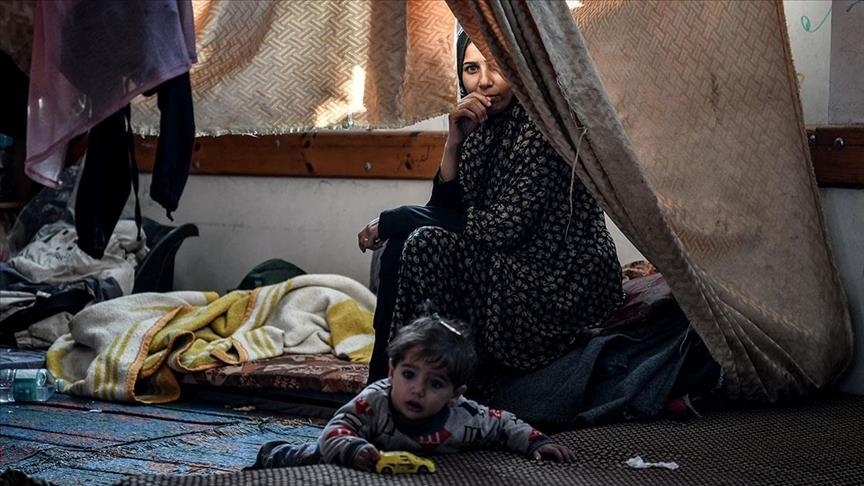Gaza's displaced Palestinians struggle as medication shortages worsen amid ongoing Israeli attacks
Palestinians with chronic illnesses, including psychological depression, face critical treatment gaps due to 105-day long conflict

GAZA
Palestinians in the Gaza Strip, who have been displaced and suffer from chronic illnesses, have been unable to continue their treatments for months due to Israel's ongoing attacks for the past 105 days.
Reda Awad is unable to receive her specialized treatment for "psychological depression," a condition she has been suffering with for 10 years.
This is due to a severe shortage of medications in Gaza, resulting from the ongoing Israeli war since Oct. 7.
Awad, who has undergone two displacement journeys from the Bureij refugee camp in central Gaza to a newly established camp in Rafah in the south, is trying to cope with her chronic illness and its emerging and evolving complications.
The mother of seven children living in a tent house with 28 people, is one of hundreds of thousands of Palestinians with chronic diseases who have not received medications for months.
The Palestinian Ministry of Health in Gaza said Tuesday that 350,000 chronic patients are not receiving medications due to the Israeli war.
It warned of serious health complications faced by patients due to the lack of medication, urging international institutions to "urgently provide treatment for chronic patients."
Palestinian and international health and human rights institutions had previously warned of the collapse of the health sector in Gaza due to the war.
Since Oct. 7, 2023, the Israeli army has been waging a destructive war on Gaza, resulting in 24,620 deaths and 61,830 injuries as of Thursday.
This war has led to the displacement of more than 85% -- 1.9 million residents -- of the population in the Strip, according to Palestinian authorities and the United Nations.
Severe complications
"I have not received the treatment for psychological depression that I have been suffering from for 10 years for over two months now," Awad told Anadolu. "This treatment is currently unavailable, causing significant health complications for me."
The symptoms include "severe dizziness, vomiting, and loss of pain sensation," according to Awad.
She added: "At times, I can immerse my hands in extremely hot water and not feel any pain. I also experience severe forgetfulness, where I can perform ablutions multiple times a day without realizing it."
In addition, she often wakes up "startled from her sleep, crying and screaming suddenly," as she described the complications of her depression.
She called for the urgent provision of her specific treatments for the sake of her mental and physical health.
Harsh reality
Fayez Abdo, 67, has stopped taking medication for diabetes and chronic hypertension for four months.
Abdo, who went through two displacement experiences from the Bureij camp to Nuseirat in central Gaza and then to Rafah, lives inside a room made of zinc sheets, along with five families.
He told Anadolu that the war also deprived him of medications for secondary illnesses resulting from diabetes and hypertension.
He noted that an Israeli strike targeted a neighboring house before his displacement, causing an injury to his foot, which deteriorated rapidly due to diabetes and the lack of treatment.
He said he used to receive medications from a clinic in the Bureij camp, but he now lives without medicine and without food that contributes to boosting his body's immunity.
"Today, I can't walk on my foot. Whenever I try to walk, I don't feel any balance during walking," he said.
Several Palestinians in Gaza have previously stated that they cannot find medications in pharmacies or hospitals.
The Ministry of Health has stated multiple times that the sector is suffering from a shortage of medicines and medical supplies due to the numerous injuries reaching the hospitals.
Since the start of the destructive war on the sector on Oct. 7, Israel has cut off water, food, medicine, electricity and fuel supplies to residents of Gaza -- nearly 2.3 million Palestinians who are already in extremely deteriorated conditions.
*Writing by Alperen Aktas from Istanbul








